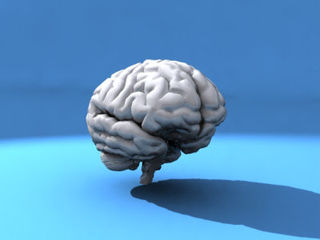Depression
Why the Mind Is More Than the Brain
The fallacy of reducing psychology to neurology
Posted January 18, 2017

Earlier this week the results of a study were published showing that cognitive-behavioral therapy (CBT) can strengthen connections in the brains of people suffering from psychosis, and that these connections were associated with better mental health, and recovery. The study tracked the mental health of 15 people over 8 years through their medical records and through assessments. Brain scans showed that there were strong connections in several parts of the brain, but particularly in the amygdala and the frontal lobes (associated with rational thinking) — areas which are strongly associated with recovery from psychosis. (1)
Changes in the brain have certainly been linked to CBT before — for example, a few years ago, people suffering from ‘pathological perfectionism’ were given a 12 week course of CBT, and it was found afterwards that they had significant changes in the cortex of the brain, with a significantly higher level of ‘cortical inhibition.’ But this new study is the first to show that neurological changes caused by CBT are linked to long term recovery from psychosis.
These findings lend support to the argument that medication is prescribed far too frequently for psychosis, in place of other potentially more effective therapies. In the UK (where I live), there seems to be a growing awareness that psychoactive drugs have limited effectiveness, and that even when they do seem to reduce symptoms, benefits are often outweighed by their negative side effects. More and more psychiatrists and psychologists are advocating non-medical therapies — not only CBT, but mindfulness, and even forms of ecotherapy.
The Mind and the Brain
However, the results of this study have perhaps an even greater significance than this. In our culture, the brain reigns supreme. Most scientists, doctors and academics see the brain as the source of our conscious experience, of our states of mind, our thoughts, emotions and sensations. Consciousness is often seen as the product of the brain, in the same way that the images of a computer screen are the result of the electrical circuitry and software inside the computer. This is the assumption that underlies the ‘medical model’ of mental illness - that mental problems are caused by imbalances or dysfunctions in the brain, and can be ‘fixed’ by psychoactive drugs. But it also applies to other aspects of our psychological experience. Mental phenomena such as happiness, hope, love and ‘spiritual’ experiences can also be explained in terms of neurological activity.
In this way psychology is reduced to neurology. The mind is merely an epiphenomenon of the brain, and can only be understood in terms of neurology. This attitude is often reflected in the language that people use to talk about psychological issues. Neurological terms are often used to described psychological phenomena, as if they are the same thing. For example, in an interview I heard on the radio the other day about the above study on CBT, a person who had found CBT helpful in recovery from psychosis was interviewed, together with the leader of the study (Dr. Liam Mason). Several times the interviewer asked questions like ‘So how did CBT retrain your brain?’ and ‘So you believe that CBT can have a better effect on the brain than medication?’ Of course, what the interviewer was really talking about was the mind.
This research is highly significant because it shows that the mind is not just a product of brain activity. If it were, it would be impossible for changes in psychological functioning to bring about changes in the brain, in the same way that it would be impossible for changes in the images on a computer screen to bring about changes to the circuitry of a computer. This highlights the fact that the psyche is a phenomenon in its own right, with its own features, its own structures and patterns. It can’t be entirely reduced to neurology. It has to be studied in its own terms.
Symbiosis of the Mind and Brain
Of course, I’m not saying that the neurological changes have no effect on mental activity. That would be absurd. Major changes to the brain such as strokes, injuries or conditions such as dementia can clearly affect and impair our psychological functioning. And more minor changes — such as those caused by the ingestion of drugs — clearly have very marked psychological effects too. But we have to remember that this casual relationship works the other way around, and that changes to psychological functioning cause neurological changes. This has not only been illustrated by the above research into CBT, but also by a massive amount of research into meditation and mindfulness. The phenomenon of neuroplasticity shows this too — that the brain is continually in flux and changes according to how we use it.
This suggests the intriguing possibility that when certain psychological conditions do seem to be associated with certain brain states, in some cases this may be because the mental state generates the neurological state, rather than the other way round. In other words, if depression is associated with a low level of serotonin (although this link is by no means proven), this may be because the state of being depressed generates a low level of serotonin, rather than a low level of serotonin causing depression. When depression is caused by existential or cognitive factors — such as lack of a sense of purpose and meaning, or negative thought patterns — it's easy to see how the state of depression arises first as a psychological state, which then has neurological effects. This makes sense in view of the very limited success anti-depressant medication such as SSRis (Selective serotonin re-uptake inhibitors) in alleviating depression. To treat psychological problems as medical problems is as misguided as using psychotherapy to treat injuries to the body. We shouldn't be surprised to find that psychotherapy is more effective against depression and psychosis than medication, in the same way that we shouldn't be surprised to find that medical treatment is more effective against a broken bone than psychotherapy.
The brain and the mind exist in a symbiotic relationship, in which they both affect each other, but in which neither is entirely the other. As a result, to some extent, we have treat them as distinct phenomena.
Steve Taylor PhD is a senior lecturer in psychology at Leeds Beckett University, UK. www.stevenmtaylor.com
References
Mason, L. at al. (2017). Brain connectivity changes occurring following cognitive behavioural therapy for psychosis predict long-term recovery. Translational Psychiatry (2017) 7, e1001; doi:10.1038/tp.2016.263


